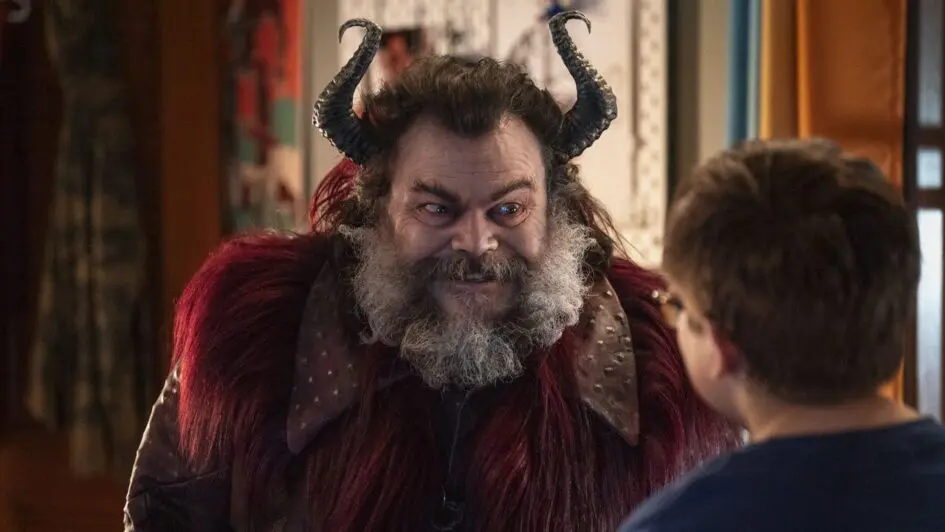Released in 1988, Beetlejuice quickly became a cultural phenomenon. Tim Burton combined quirky humor, inventive visuals and a delightfully macabre sensibility that captured audiences’ imaginations. With its unforgettable performances — most notably Michael Keaton’s manic and mischievous portrayal of the titular ghost — the movie struck a perfect balance between comedy and the supernatural, blending Burton’s signature gothic charm with a playful edge.
Now, let’s indulge our imagination for a moment: What if the original Beetlejuice was made today?
Imagine keeping everything exactly as it was — the same quirky script, the same plot — but with a modern cast. Would it still capture the magic and reclaim its status as a timeless classic, or would it feel out of place and outdated in today’s cinematic landscape?
What if we slightly tweaked it to make it a Christmas comedy? Well, have no fear, ’cause Paramount has the answer for us!
Exclusively shown on Paramount+, Dear Santa is directed by Bobby Farrelly and written by Farrelly and Ricky Blitt, the film tells the heartwarming and unconventional story of Liam Turner (Robert Timothy Smith), a charming and kind-hearted boy navigating the challenges of dyslexia. Bullied at school for his condition, Liam’s gentle nature remains unshaken despite a tumultuous home life, where his parents, Molly (Brianne Howey) and Bill (Hayes MacArthur), are on the brink of divorce.
Thankfully, Liam finds solace in his loyal friend, Gibby (Jaden Carson Baker).
One day during the Christmas season, Liam writes a letter to Santa with his wish list, but his dyslexia adds an unexpected twist: the letter is addressed to “Dear Satan.” That night, Satan (Jack Black) appears in Liam’s bedroom, offering to grant him three wishes in exchange for his soul. Though initially horrified and resolute in his refusal, Liam begins to waver, setting the stage for Satan to begin his devilish contract proceedings. Yet, as Satan ramps up the pressure, Liam’s unwavering goodness starts to affect him in surprising ways.
What begins as a darkly comedic bargain transforms into a touching story of redemption, kindness and the unexpected power of a pure heart to change even the most unlikely of beings.
As I watched Dear Santa, the moment Satan entered the scene, I couldn’t help but be reminded of Beetlejuice. Jack Black’s portrayal of Satan, with his gritty and gruff voice, felt like an homage to Michael Keaton’s iconic performance as the “Ghost with the Most.” Both characters wield their supernatural powers to manipulate the world around them in mischievous, often absurd ways, whether it’s Satan making a cat play basketball or Beetlejuice starting a dance line to “Day-O.”
They also share similar agendas, relying on their human “friends” to sacrifice something precious — Liam’s soul for Satan, Lydia’s life for Beetlejuice — to achieve their goals. Yet, despite their self-serving intentions, both characters develop an unexpected bond with their human counterparts, showcasing a surprising vulnerability in their otherwise outrageous antics. Satan’s dynamic with Liam mirrors Beetlejuice’s with Lydia, blending humor, heart and a touch of the macabre.
In contrast, Dear Santa falls flat in its attempt at comedy. While Beetlejuice delivered humor that, even if dated by today’s standards, worked for its time, Dear Santa stumbles into the same pitfalls that critics have levied upon its sequel: weak and poorly executed jokes. Jack Black and the cast do their best with the material, but the formula that once brought the Farrelly Brothers so much success now feels outdated. Sophomoric humor, like an unnecessarily long fart scene, fails to resonate with modern audiences.
Even Black’s energetic improvisation can’t salvage jokes that simply don’t land.
Another glaring weakness of Dear Santa is its inability to navigate emotional transitions effectively. The film struggles to balance its heartfelt moments with its crude humor, resulting in jarring tonal shifts. A touching scene between Liam and his parents may abruptly veer into inappropriate comedy, undermining the emotional impact.
In one pivotal moment, I found myself moved to tears, only for the story to awkwardly inject a clumsy, humorless “What do I do now” gag, robbing the scene of its poignancy. These abrupt and poorly handled shifts between emotional highs and lows leave the film feeling disjointed and uninspired, making for a lackluster experience overall.
Through all of its fault in storytelling, Dear Santa does create a lovable protagonist. Liam is an instantly endearing character whose goodness and selflessness shine through every scene, brought to life with charm and vulnerability by Robert Timothy Smith. Crafted as both relatable and admirable, Liam’s unwavering kindness, even when faced with temptation, makes him a character the audience can’t help but root for. Smith’s standout performance pairs seamlessly with Jack Black’s energetic portrayal of Satan, creating a dynamic and heartfelt duo. Their chemistry balances humor and sincerity, keeping viewers engaged throughout the story.
Smith’s nuanced performance solidifies him as a rising talent, while Black’s larger-than-life energy reminds us of his mastery in creating memorable on-screen partnerships.
I give Dear Santa a solid three out of five stars. The film feels like a Christmas-infused take on Beetlejuice, with both featuring fun antagonists who are polar opposites of their more grounded counterparts. Jack Black channels a similar comedic energy and timing that made Michael Keaton’s performance iconic, while Robert Timothy Smith delivers a heartfelt portrayal of Liam that resonates deeply with audiences.
However, the Farrelly Brothers’ signature humor struggles to keep up with the times, with outdated jokes that fail to land in today’s comedic landscape. Dear Santa has the potential to become a modern holiday classic, but it ultimately falls short of greatness, weighed down by its reliance on an aging formula that doesn’t quite connect.

